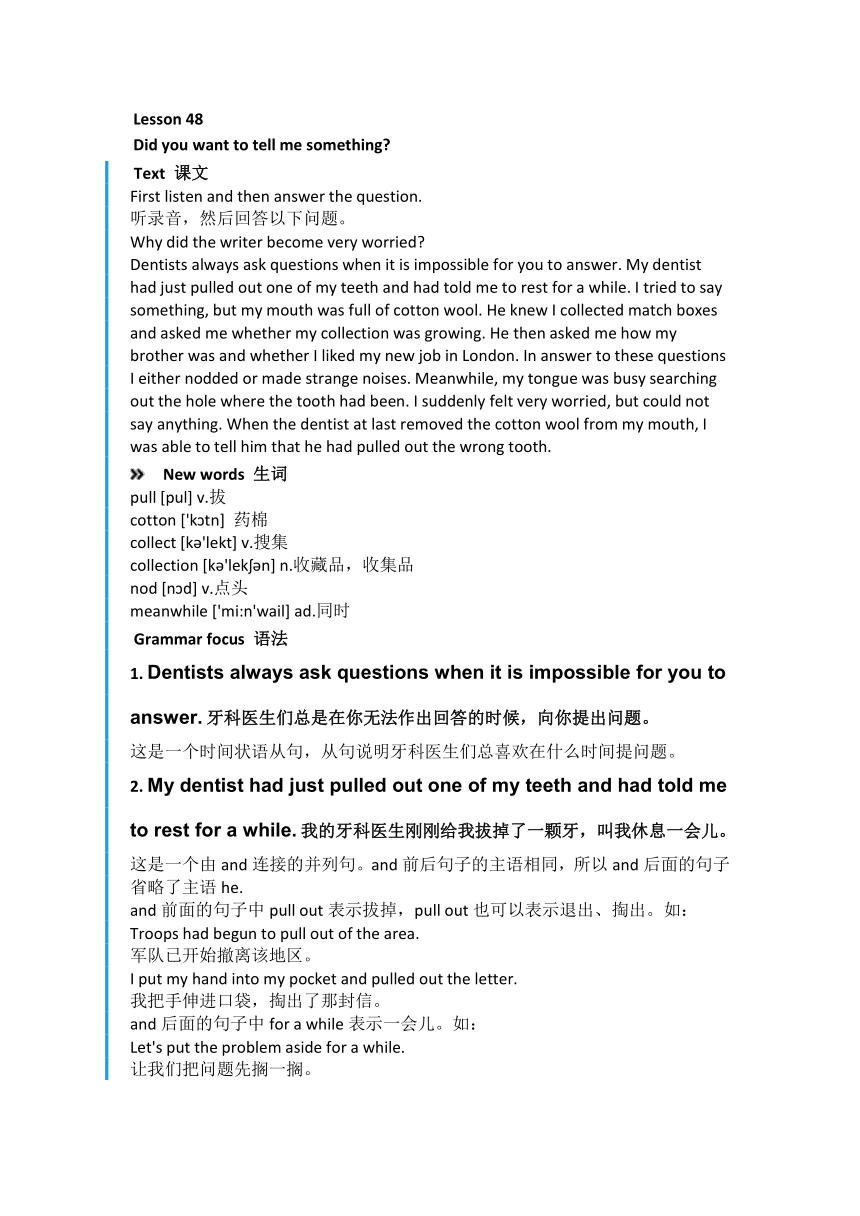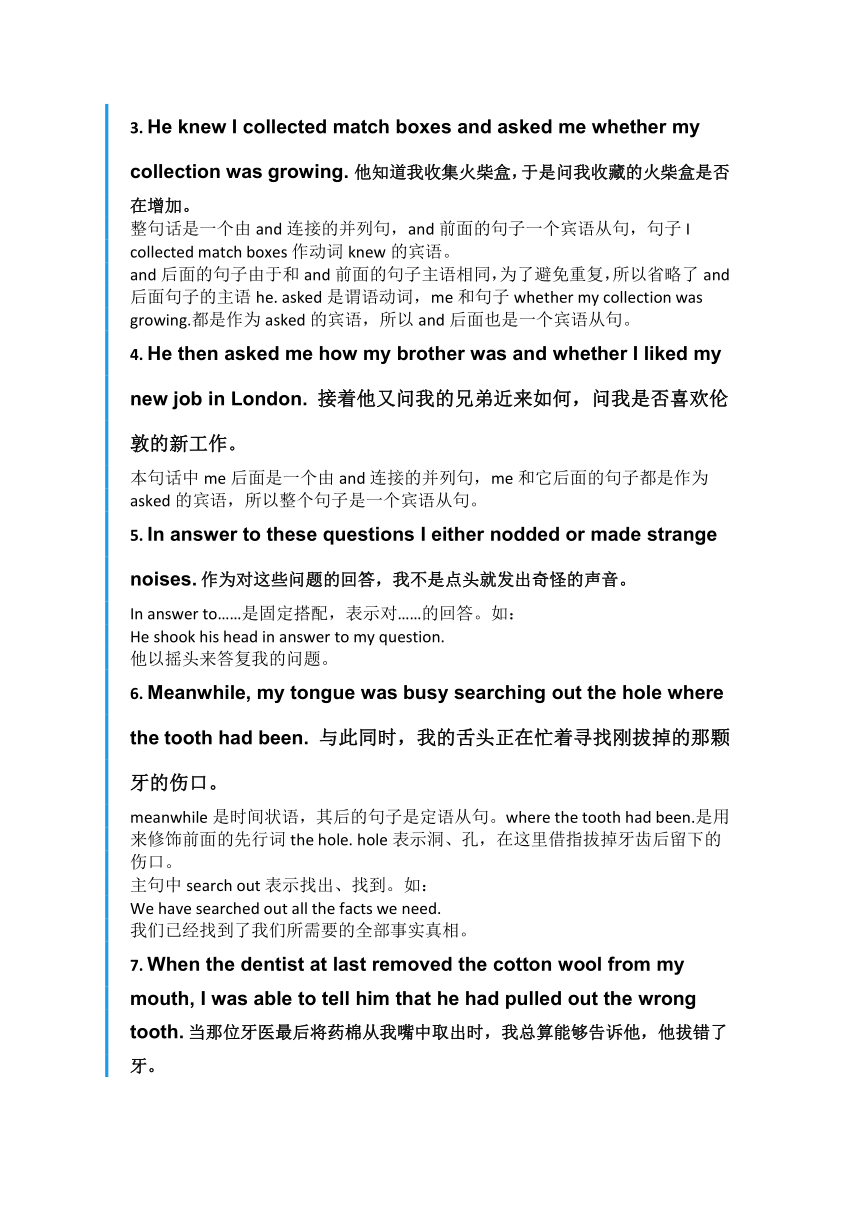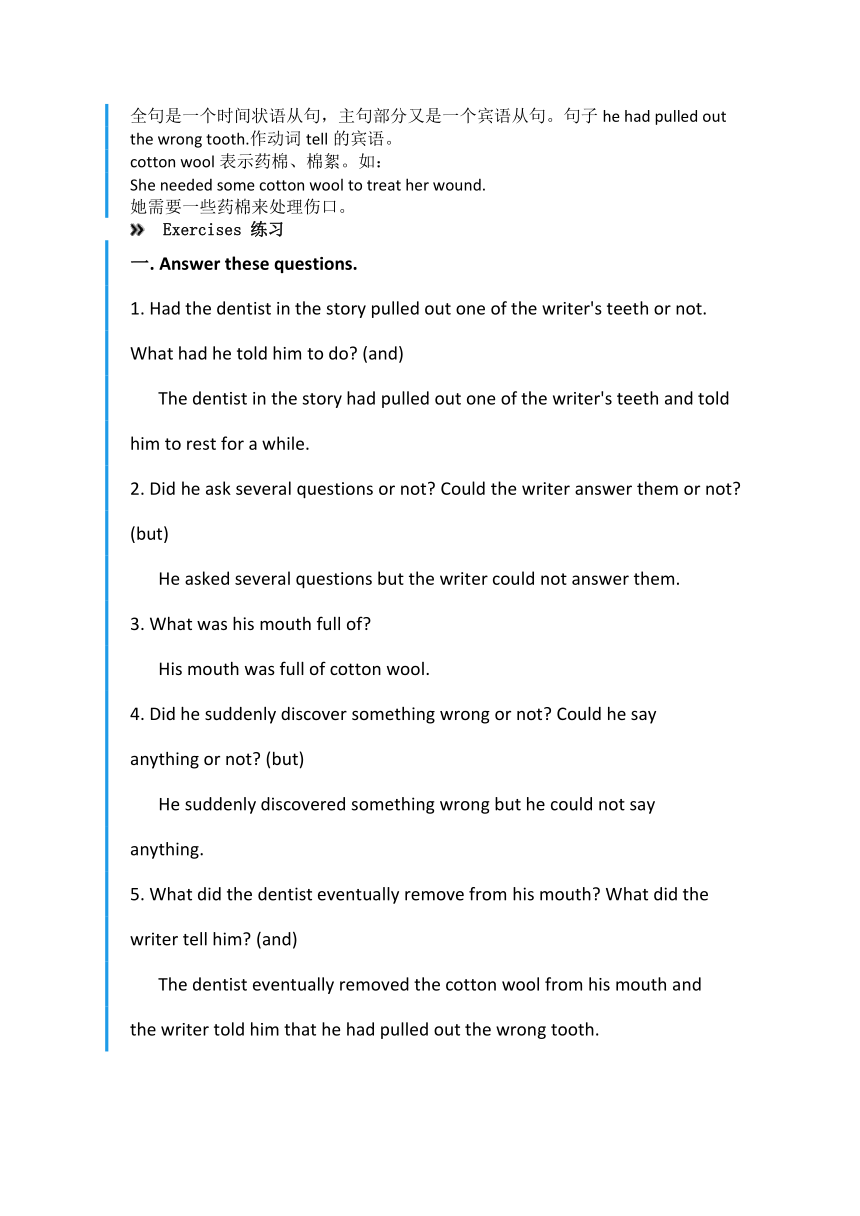新概念英语第二册 Lesson 48 Did you want to tell me something 讲义
文档属性
| 名称 | 新概念英语第二册 Lesson 48 Did you want to tell me something 讲义 |  | |
| 格式 | docx | ||
| 文件大小 | 21.8KB | ||
| 资源类型 | 教案 | ||
| 版本资源 | 新概念英语 | ||
| 科目 | 英语 | ||
| 更新时间 | 2024-01-30 10:29:52 | ||
图片预览



文档简介
Lesson 48
Did you want to tell me something
Text 课文
First listen and then answer the question.
听录音,然后回答以下问题。
Why did the writer become very worried
Dentists always ask questions when it is impossible for you to answer. My dentist had just pulled out one of my teeth and had told me to rest for a while. I tried to say something, but my mouth was full of cotton wool. He knew I collected match boxes and asked me whether my collection was growing. He then asked me how my brother was and whether I liked my new job in London. In answer to these questions I either nodded or made strange noises. Meanwhile, my tongue was busy searching out the hole where the tooth had been. I suddenly felt very worried, but could not say anything. When the dentist at last removed the cotton wool from my mouth, I was able to tell him that he had pulled out the wrong tooth.
New words 生词
pull [pul] v.拔
cotton ['k tn] 药棉
collect [k 'lekt] v.搜集
collection [k 'lek n] n.收藏品,收集品
nod [n d] v.点头
meanwhile ['mi:n'wail] ad.同时
Grammar focus 语法
1. Dentists always ask questions when it is impossible for you to answer. 牙科医生们总是在你无法作出回答的时候,向你提出问题。
这是一个时间状语从句,从句说明牙科医生们总喜欢在什么时间提问题。
2. My dentist had just pulled out one of my teeth and had told me to rest for a while. 我的牙科医生刚刚给我拔掉了一颗牙,叫我休息一会儿。
这是一个由and连接的并列句。and前后句子的主语相同,所以and后面的句子省略了主语he.
and前面的句子中pull out表示拔掉,pull out也可以表示退出、掏出。如:
Troops had begun to pull out of the area.
军队已开始撤离该地区。
I put my hand into my pocket and pulled out the letter.
我把手伸进口袋,掏出了那封信。
and后面的句子中for a while表示一会儿。如:
Let's put the problem aside for a while.
让我们把问题先搁一搁。
3. He knew I collected match boxes and asked me whether my collection was growing. 他知道我收集火柴盒,于是问我收藏的火柴盒是否在增加。
整句话是一个由and连接的并列句,and前面的句子一个宾语从句,句子I collected match boxes作动词knew的宾语。
and后面的句子由于和and前面的句子主语相同,为了避免重复,所以省略了and后面句子的主语he. asked是谓语动词,me和句子whether my collection was growing.都是作为asked的宾语,所以and后面也是一个宾语从句。
4. He then asked me how my brother was and whether I liked my new job in London. 接着他又问我的兄弟近来如何,问我是否喜欢伦敦的新工作。
本句话中me后面是一个由and连接的并列句,me和它后面的句子都是作为asked的宾语,所以整个句子是一个宾语从句。
5. In answer to these questions I either nodded or made strange noises. 作为对这些问题的回答,我不是点头就发出奇怪的声音。
In answer to……是固定搭配,表示对……的回答。如:
He shook his head in answer to my question.
他以摇头来答复我的问题。
6. Meanwhile, my tongue was busy searching out the hole where the tooth had been. 与此同时,我的舌头正在忙着寻找刚拔掉的那颗牙的伤口。
meanwhile是时间状语,其后的句子是定语从句。where the tooth had been.是用来修饰前面的先行词the hole. hole表示洞、孔,在这里借指拔掉牙齿后留下的伤口。
主句中search out表示找出、找到。如:
We have searched out all the facts we need.
我们已经找到了我们所需要的全部事实真相。
7. When the dentist at last removed the cotton wool from my mouth, I was able to tell him that he had pulled out the wrong tooth. 当那位牙医最后将药棉从我嘴中取出时,我总算能够告诉他,他拔错了牙。
全句是一个时间状语从句,主句部分又是一个宾语从句。句子he had pulled out the wrong tooth.作动词tell的宾语。
cotton wool表示药棉、棉絮。如:
She needed some cotton wool to treat her wound.
她需要一些药棉来处理伤口。
Exercises 练习
一. Answer these questions.
1. Had the dentist in the story pulled out one of the writer's teeth or not. What had he told him to do (and)
The dentist in the story had pulled out one of the writer's teeth and told him to rest for a while.
2. Did he ask several questions or not Could the writer answer them or not (but)
He asked several questions but the writer could not answer them.
3. What was his mouth full of
His mouth was full of cotton wool.
4. Did he suddenly discover something wrong or not Could he say anything or not (but)
He suddenly discovered something wrong but he could not say anything.
5. What did the dentist eventually remove from his mouth What did the writer tell him (and)
The dentist eventually removed the cotton wool from his mouth and the writer told him that he had pulled out the wrong tooth.
二. Rewrite the following sentences using the joining words in parentheses.
1. The dentist smiled. He showed me the tooth. (and)
The dentist smiled and showed me the tooth.
2. He had pulled out the right one. I did not realize it.(but)
He had pulled out the right one but I had not realized it.
3. I had made a mistake. I had criticized his work. (not only…but…as well)
I had not only made a mistake but criticized his work as well.
三. Arrange the following heading in the correct order. Supply full stops and commas; make any other changes you consider necessary.
England/Seaview Hotel/Princes' Avenue/23 September 19__/Brighton.
Seaview Hotel,
Princes' Avenue,
Brighton,
England.
September 23rd. 19__
四. Choose the correct words in the following statements.
1. The new school, (which) (who) has just been completed is a fine building.
2. He (denied) (refused) that he had taken it.
3. The waiter (took) (fetched) me a clean glass.
4. He is (too) (very) ill to do any work.
5. I had a few (works) (jobs) to do in town this morning.
6. (A) (One) day I spoke to (one) (a) man (who) (whom) had won the Nobel Prize.
7. A bird flew (past) (passed) my window.
8. We spent the first day of our holidays in Geneva. The (next) (other) day we went to Basle.
9. I spent the whole afternoon (watching) (following) the match.
10. Ships (continuously) (continually) cross the sea.
11. 'Did you take that book from the shelf ' He (remarked) (noticed) suddenly
12. The bank has been (stolen) (robbed).
五. Write sentences using so, such, or such a with the following words: trouble, beautiful, nice day, tired.
Most people have experience of such trouble.
大多数人都经历过这种麻烦。
The girl is so beautiful that everybody likes her.
这个小女孩太漂亮了,每个人都喜欢她。
It is such a nice day today!
今天的天气真不错!
You look so tired.
你看起来太累了。
六. Join these sentences using no sooner than.
1. He had come home. They rang him up from the office.
He had no sooner come home than they rang him up from the office.
2. The plane had taken off. It returned to the airport.
The plane had no sooner taken off than it returned to the airport.
七. Supply the correct form of make or do in the following sentences.
1. He has made progress.
2. You never do a job properly.
3. Why can't you make up your mind
4. I have to go out now. I must do some shopping.
5. Do me a favor, will you
6. Don't make such a noise.
7. You have just made a mistake.
8. He always does his best.
八. Complete these sentences by adding any of the following words: up with, up, off, out, away, back.
1. Have they put out that forest fire
2. Haven't you learnt how to look up a word in the dictionary
3. I tried to call her up but her phone was out of order.
4. Pick up all those toys and put them away.
5. If you can't find a room at the hotel, I can put you up.
6. Look out! That bus nearly hit you.
7. I'll pay back the money I borrowed as soon as I can.
8. I can't put up with those children any longer.
9. He's so far ahead of you. You'll never catch up with him.
九. Use each of the following phrases in sentences.
at once, at a loss, at last, at present, at home.
I recognized his voice at once.
我立刻听出了他的声音。
I was at a loss for what to do next.
下一步该怎么做,我完全没谱。
The case came to an end at last.
这案子终于完结了。
I don't need the dictionary at present.
我现在不需要这本字典。
Last night they stayed at home and watched TV.
昨晚他们呆在了家里看电视。
Did you want to tell me something
Text 课文
First listen and then answer the question.
听录音,然后回答以下问题。
Why did the writer become very worried
Dentists always ask questions when it is impossible for you to answer. My dentist had just pulled out one of my teeth and had told me to rest for a while. I tried to say something, but my mouth was full of cotton wool. He knew I collected match boxes and asked me whether my collection was growing. He then asked me how my brother was and whether I liked my new job in London. In answer to these questions I either nodded or made strange noises. Meanwhile, my tongue was busy searching out the hole where the tooth had been. I suddenly felt very worried, but could not say anything. When the dentist at last removed the cotton wool from my mouth, I was able to tell him that he had pulled out the wrong tooth.
New words 生词
pull [pul] v.拔
cotton ['k tn] 药棉
collect [k 'lekt] v.搜集
collection [k 'lek n] n.收藏品,收集品
nod [n d] v.点头
meanwhile ['mi:n'wail] ad.同时
Grammar focus 语法
1. Dentists always ask questions when it is impossible for you to answer. 牙科医生们总是在你无法作出回答的时候,向你提出问题。
这是一个时间状语从句,从句说明牙科医生们总喜欢在什么时间提问题。
2. My dentist had just pulled out one of my teeth and had told me to rest for a while. 我的牙科医生刚刚给我拔掉了一颗牙,叫我休息一会儿。
这是一个由and连接的并列句。and前后句子的主语相同,所以and后面的句子省略了主语he.
and前面的句子中pull out表示拔掉,pull out也可以表示退出、掏出。如:
Troops had begun to pull out of the area.
军队已开始撤离该地区。
I put my hand into my pocket and pulled out the letter.
我把手伸进口袋,掏出了那封信。
and后面的句子中for a while表示一会儿。如:
Let's put the problem aside for a while.
让我们把问题先搁一搁。
3. He knew I collected match boxes and asked me whether my collection was growing. 他知道我收集火柴盒,于是问我收藏的火柴盒是否在增加。
整句话是一个由and连接的并列句,and前面的句子一个宾语从句,句子I collected match boxes作动词knew的宾语。
and后面的句子由于和and前面的句子主语相同,为了避免重复,所以省略了and后面句子的主语he. asked是谓语动词,me和句子whether my collection was growing.都是作为asked的宾语,所以and后面也是一个宾语从句。
4. He then asked me how my brother was and whether I liked my new job in London. 接着他又问我的兄弟近来如何,问我是否喜欢伦敦的新工作。
本句话中me后面是一个由and连接的并列句,me和它后面的句子都是作为asked的宾语,所以整个句子是一个宾语从句。
5. In answer to these questions I either nodded or made strange noises. 作为对这些问题的回答,我不是点头就发出奇怪的声音。
In answer to……是固定搭配,表示对……的回答。如:
He shook his head in answer to my question.
他以摇头来答复我的问题。
6. Meanwhile, my tongue was busy searching out the hole where the tooth had been. 与此同时,我的舌头正在忙着寻找刚拔掉的那颗牙的伤口。
meanwhile是时间状语,其后的句子是定语从句。where the tooth had been.是用来修饰前面的先行词the hole. hole表示洞、孔,在这里借指拔掉牙齿后留下的伤口。
主句中search out表示找出、找到。如:
We have searched out all the facts we need.
我们已经找到了我们所需要的全部事实真相。
7. When the dentist at last removed the cotton wool from my mouth, I was able to tell him that he had pulled out the wrong tooth. 当那位牙医最后将药棉从我嘴中取出时,我总算能够告诉他,他拔错了牙。
全句是一个时间状语从句,主句部分又是一个宾语从句。句子he had pulled out the wrong tooth.作动词tell的宾语。
cotton wool表示药棉、棉絮。如:
She needed some cotton wool to treat her wound.
她需要一些药棉来处理伤口。
Exercises 练习
一. Answer these questions.
1. Had the dentist in the story pulled out one of the writer's teeth or not. What had he told him to do (and)
The dentist in the story had pulled out one of the writer's teeth and told him to rest for a while.
2. Did he ask several questions or not Could the writer answer them or not (but)
He asked several questions but the writer could not answer them.
3. What was his mouth full of
His mouth was full of cotton wool.
4. Did he suddenly discover something wrong or not Could he say anything or not (but)
He suddenly discovered something wrong but he could not say anything.
5. What did the dentist eventually remove from his mouth What did the writer tell him (and)
The dentist eventually removed the cotton wool from his mouth and the writer told him that he had pulled out the wrong tooth.
二. Rewrite the following sentences using the joining words in parentheses.
1. The dentist smiled. He showed me the tooth. (and)
The dentist smiled and showed me the tooth.
2. He had pulled out the right one. I did not realize it.(but)
He had pulled out the right one but I had not realized it.
3. I had made a mistake. I had criticized his work. (not only…but…as well)
I had not only made a mistake but criticized his work as well.
三. Arrange the following heading in the correct order. Supply full stops and commas; make any other changes you consider necessary.
England/Seaview Hotel/Princes' Avenue/23 September 19__/Brighton.
Seaview Hotel,
Princes' Avenue,
Brighton,
England.
September 23rd. 19__
四. Choose the correct words in the following statements.
1. The new school, (which) (who) has just been completed is a fine building.
2. He (denied) (refused) that he had taken it.
3. The waiter (took) (fetched) me a clean glass.
4. He is (too) (very) ill to do any work.
5. I had a few (works) (jobs) to do in town this morning.
6. (A) (One) day I spoke to (one) (a) man (who) (whom) had won the Nobel Prize.
7. A bird flew (past) (passed) my window.
8. We spent the first day of our holidays in Geneva. The (next) (other) day we went to Basle.
9. I spent the whole afternoon (watching) (following) the match.
10. Ships (continuously) (continually) cross the sea.
11. 'Did you take that book from the shelf ' He (remarked) (noticed) suddenly
12. The bank has been (stolen) (robbed).
五. Write sentences using so, such, or such a with the following words: trouble, beautiful, nice day, tired.
Most people have experience of such trouble.
大多数人都经历过这种麻烦。
The girl is so beautiful that everybody likes her.
这个小女孩太漂亮了,每个人都喜欢她。
It is such a nice day today!
今天的天气真不错!
You look so tired.
你看起来太累了。
六. Join these sentences using no sooner than.
1. He had come home. They rang him up from the office.
He had no sooner come home than they rang him up from the office.
2. The plane had taken off. It returned to the airport.
The plane had no sooner taken off than it returned to the airport.
七. Supply the correct form of make or do in the following sentences.
1. He has made progress.
2. You never do a job properly.
3. Why can't you make up your mind
4. I have to go out now. I must do some shopping.
5. Do me a favor, will you
6. Don't make such a noise.
7. You have just made a mistake.
8. He always does his best.
八. Complete these sentences by adding any of the following words: up with, up, off, out, away, back.
1. Have they put out that forest fire
2. Haven't you learnt how to look up a word in the dictionary
3. I tried to call her up but her phone was out of order.
4. Pick up all those toys and put them away.
5. If you can't find a room at the hotel, I can put you up.
6. Look out! That bus nearly hit you.
7. I'll pay back the money I borrowed as soon as I can.
8. I can't put up with those children any longer.
9. He's so far ahead of you. You'll never catch up with him.
九. Use each of the following phrases in sentences.
at once, at a loss, at last, at present, at home.
I recognized his voice at once.
我立刻听出了他的声音。
I was at a loss for what to do next.
下一步该怎么做,我完全没谱。
The case came to an end at last.
这案子终于完结了。
I don't need the dictionary at present.
我现在不需要这本字典。
Last night they stayed at home and watched TV.
昨晚他们呆在了家里看电视。
同课章节目录
